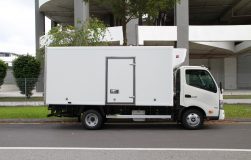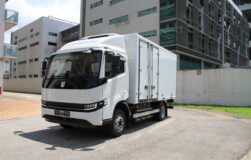Refrigeration trucks have undergone significant evolution, revolutionizing the transportation of perishable goods within the cold chain industry. From their origins as rudimentary ice-cooled compartments in the early 20th century to today’s sophisticated refrigeration systems, these trucks have continually advanced in efficiency and reliability. Initially limited by the need for frequent stops to replenish ice, the development of mechanical refrigeration systems in the mid-20th century marked a pivotal advancement, allowing for more consistent temperature control and extended transportation distances. Subsequent innovations in insulation materials and refrigeration technologies further improved efficiency and reduced energy consumption. In modern times, refrigeration trucks are equipped with state-of-the-art technologies such as digital temperature control systems and IoT integration. These advancements enable precise monitoring and adjustment of cargo conditions in real-time, minimizing the risk of spoilage and ensuring compliance with stringent food safety regulations. Leading manufacturers and logistics providers have embraced these innovations, implementing hybrid refrigeration systems and sustainable refrigerants to enhance operational efficiency while reducing environmental impact. Looking ahead, the future of refrigeration trucks holds promise with emerging technologies like autonomous driving and sustainable energy solutions poised to further revolutionize the industry. By embracing these advancements, the cold chain logistics sector can continue to ensure the safe and efficient transport of perishable goods while advancing towards a more sustainable future.





